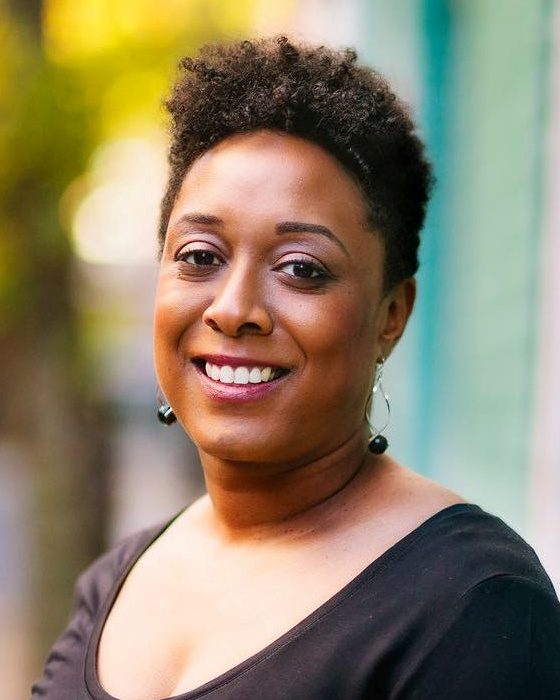
Kentina Washington-Leapheart Oral History
Part 1:
Part 2:
→ Transcript of Kentina Washington-Leapheart’s interview:
Part 1, Part 2
Biography
Kentina Washington was born in 1980 and raised in the suburbs of Cleveland, Ohio. She spent her childhood living in the diverse neighborhood of Cleveland Heights. Her grandparents moved into the area when her mother was young and remained there. Kentina grew up an only child to a single mother. She spent a lot of time at the library and playing with other children from the neighborhood. As she got older and moved into high school, she had a part-time job and participated in extracurricular activities like drama club and the gospel choir as well as volunteering. She also babysat a lot for young families in the area and liked being around children. During her younger years though, she didn’t have a hugely religious background, despite being part of the gospel choir.
From very early on, the value of a good education and hard work was instilled in her. As the child of a single mother, she saw her mom work hard as a mail carrier and later a USPS supervisor in order to afford a home of their own in the same neighborhood where her grandparents lived. Her mother’s mother watched both local and national news almost constantly and Kentina developed an appreciation for current events and things happening around her in a bigger context when spending time at her grandmother’s home. Her father’s side of the family were avid readers and regular patrons of the arts, and her grandmother would often take her to plays, concerts, and other cultural events.
After high school, Kentina applied to Hampton University and Howard University and had her heart set on attending an HBCU. Life had other plans however, and she ultimately ended up attending Miami University, (Ohio) where she first majored in religion, then early childhood education before finally switching to public administration. During her first semester at Miami, she was exposed to a whole new demographic of people, and was for the first time in her life in a majority-white educational and living space vs. the multiethnic, multicultural environment that she was accustomed to. At Miami, Kentina stood in her first protest against racial injustices that had occurred on campus and in the town where the university is located. She also authored several letters-to-the-editor and op-eds on microaggressions that were included in student newspaper.
After graduating from Miami University, Kentina worked in financial services (insurance) in Cincinnati, later transferring to Chicago. She had an interest in church and spirituality but it was quite a few years before she made the decision to enroll in seminary. It was during her time in Chicago that she began attending Trinity United Church of Christ with some friends. She grew to love the church and would attend worship services often, as well as other ministry activities. During these years, Kentina desired to continue her education. Her employer at the time would only help fund her ongoing education if it was for an MBA, but she did not want an MBA. While she did not initially feel called to seminary or to pastor, she did have an interest in theology that she wanted to explore more. She considered applying to the Samuel Dewitt Proctor School of Theology at Virginia Union University, but became pregnant during this time and was unable to relocate. A few months after giving birth to her daughter and returning to work, Kentina enrolled in a class at the Seminary Consortium for Urban Pastoral Education (SCUPE). During her study there, one of her professors encouraged her to take the leap and enroll in seminary. Kentina attended Loyola University Chicago’s Institute for Pastoral Studies for a semester due to the easier commute and childcare before transferring to Garrett-Evangelical Theological Seminary and moving to Evanston.
In 2012, Kentina first identified as queer. She was out to friends and some coworkers and classmates, but not to her family at that time.
After graduating from Garrett, Kentina went into chaplaincy. Chaplaincy provided a more stable, 9-5 job, which was crucial with her being a parent to a small child. She would continue to work as a chaplain in various clinical settings for the next six years, until making a career shift to the faith-based nonprofit world. During this time, she was also in a long-distance relationship and was working to find something else that would allow herself or her partner to move closer. Eventually she took on a program director role at the Religious Institute and moved to Philadelphia, to close the gap in her long-distance relationship.
Much of Kentina’s work focuses on maternal/reproductive health, rights, and justice. She is ordained through the Fellowship of Affirming Ministries (TFAM).
When asked what motivates her in her work, she stated that “acting as a voice and amplifying the voices of those that would otherwise be drowned out by injustice”. As a mother raising a daughter, she is committed to women's health and equality. She currently lives in Philadelphia with her wife Naomi Washington-Leapheart and their daughter.
(This biographical statement written by Lynsey Allie from information in this interview and edited by Kentina Washington-Leapheart.)
Biography Date: November 2020
Additional Resources
Profiles:
Tags
Washington-Leapheart, Kentina | Black | Clergy Activist | Ohio | Philadelphia | Pennsylvania | The Fellowship of Affirming Ministries (TFAM)
Citation
“Kentina Washington-Leapheart | Oral History”, LGBTQ Religious Archives Network, accessed February 28, 2026, https://lgbtqreligiousarchives.org/oral-histories/kentina-washington-leapheart.